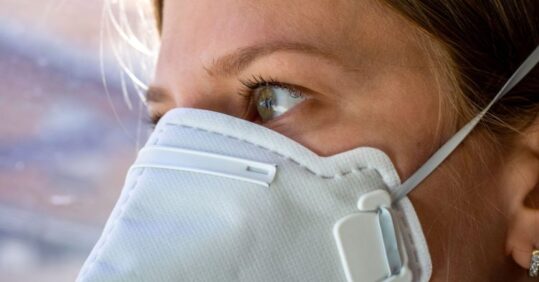General practice staff should not routinely wear FFP2 masks, says NHS England

NHS England has said general practice staff should not routinely use FFP2 respirators because surgical face masks give ‘very good protection’.
NHS England said in a webinar that they should only wear FFP2s if they have been risk assessed as needing a higher-grade FFP3 but this is unavailable.
This is in contrast to BMA advice last month saying general practice staff to wear FFP2 face masks ‘as default’ when consulting patients, while the RCN has called for all healthcare workers to be provided with FFP3 masks when working with people who have or are potentially infected with Covid-19.
Related Article: Nurses must be ‘recognised and rewarded’ to say in profession, says Streeting
The BMA has since published further advice around how to risk assess which type of face mask is needed, including both FFP2s and FFP3s.
Speaking at the webinar, held last Thursday, NHS England national infection prevention and control team member Jackie McIntyre said that GPs should use FFP3 face masks if a risk assessment deems there to be an ‘unacceptable risk’ of transmission.
She said: ‘The recommendation for PPE for Covid-19 requires the majority of healthcare workers to wear a Type II surgical face mask for all patient contact.
‘The exceptions to that would be those that are undertaking aerosol-generating procedures such as dentists or once you’ve done a hierarchy of controls risk assessment, you feel that there is an unacceptable risk of transmission, then you should consider wearing respiratory protective equipment (RPE).’
Ms McIntyre added: ‘If you can’t follow the hierarchy of controls, you’ve got lots of patients coming in, you can’t screen, you can’t triage, your staff perhaps aren’t vaccinated – and obviously there are different risks with individuals – then you may wish to wear RPE routinely.’
RPE must be either a fit-tested FFP3 respirator or something with ‘the same filtration criteria as FFP3 and not an FFP2 because that’s less filtration quality’, she said.
Related Article: Investigations into whistleblowing at NMC delayed and recommissioned
She added that wearing RPE such as FFP3 masks routinely is not ‘something you want to do in primary care’ and is ‘not necessarily required’. This is because it has lots of disadvantages, such as difficulty getting a fit test and communicating with patients, she said.
However, she added that the UK Health and Safety Executive recommends healthcare professionals ‘should not use’ FFP2 masks and that ‘the only requirement to use them’ would be ‘if you couldn’t get FFP3’.
Also speaking at the webinar, NHS England primary care medical director Dr Nikki Kanani said that NHS England will ‘make sure’ practices use FFP3 and FFP2 masks where needed, and will be writing to GPs ‘shortly’ to set this out.
Ms McIntyre added: ‘Surgical face masks give you very much good protection, there’s some good evidence.
Related Article: One in five appointments in general practice completed by a nurse
‘We’ve got some really good evidence that the precautions that we have put in place across the country and that are supported by the World Health Organisation are key and have been useful throughout the pandemic. So hopefully, that’s reassured you about that.’
Meanwhile, the BMA has published new guidance advising practice staff to wear FFP3 masks if they are risk assessed as being ‘very high risk’ and FFP2s if they are ‘high risk’.

See how our symptom tool can help you make better sense of patient presentations
Click here to search a symptom




